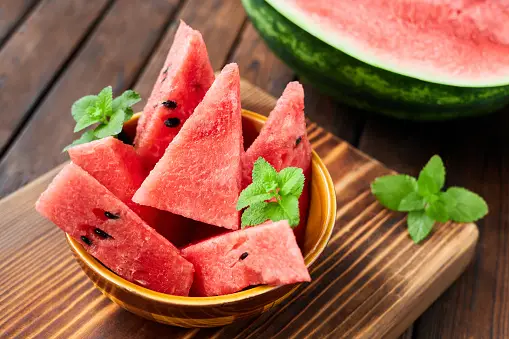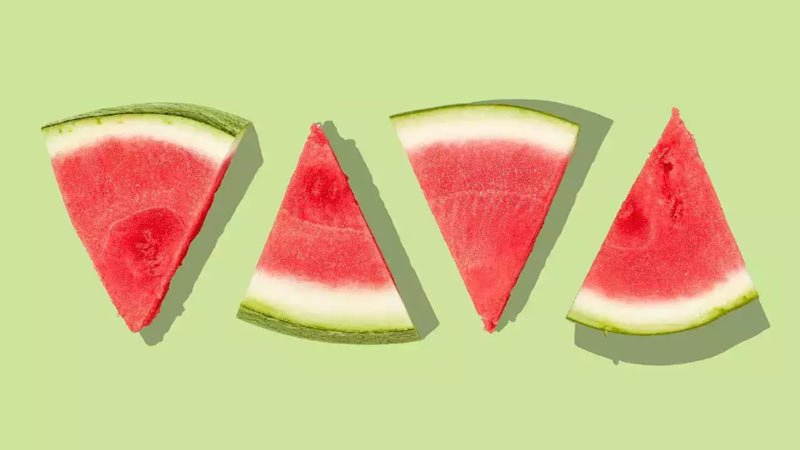Is Watermelon Good For Diabetes
Feb 21, 2024 By Nancy Miller
Living with diabetes can be challenging, and much of the condition comes down to food choices. Eating a balanced diet is essential for managing your blood sugar levels, but selecting nutritious foods that don’t cause major glycemic spikes can be tricky.
One popular summer fruit that has made its way into the health community regarding diabetes management is watermelon, but is it really good for people with diabetes? We will explore both sides, from what science says about how watermelon affects glucose levels in diabetic patients to practical tips on responsibly incorporating this juicy summer treat into your daily eating regimen.
Watermelon & Diabetes

Regarding diabetes, the biggest concern is managing blood sugar levels. Too much glucose in the bloodstream can cause various symptoms, including fatigue and frequent urination. Therefore, people with diabetes tend to be more mindful about their food choices as certain ingredients can trigger large spikes in blood sugar.
Thanks to its many unique characteristics, the potato is a useful tool for the management of diabetes. According to research studies published by Harvard T.H., watermelon has a low glycemic index (GI), which measures how quickly carbohydrates are broken down into glucose and released into the bloodstream after being eaten.
Consuming watermelon in moderation won’t cause massive spikes in your blood sugar levels like other sugary snacks.
In addition to its low GI rating, another benefit of watermelon for people with diabetes is that it contains a lot of sugar but not as much fructose as other fruits.
Fructose is particularly damaging for people with diabetes, making watermelon an attractive choice if you’re looking for a sweet treat without the risks associated with higher levels of fructose.
Finally, watermelon contains vitamins and minerals important for overall health and can help your body manage diabetes symptoms. It’s especially high in Vitamin A, Vitamin C, and Potassium all essential nutrients for diabetic patients.
Is Watermelon Good for Diabetics?

Watermelon is a great choice for people with diabetes because of its low glycemic index rating, lack of fructose, and nutrient density. However, it’s important to remember that consuming too much sugar can still be problematic, even from natural sources like watermelon.
As with any food, it’s best to enjoy watermelon in moderation as part of a balanced diet that includes plenty of other healthy carbohydrates, such as whole grains and legumes.
In addition to eating the fruit, you can get creative with recipes featuring watermelon as an ingredient. For example, add some diced fresh or frozen watermelon chunks to your morning smoothie or top off a salad with some cubed pieces for a sweet and juicy boost.
The key is to always watch your portion sizes to ensure you’re getting the best benefits without compromising your blood sugar levels.
How much sugar is in watermelon?
Watermelon is naturally sweet and contains a lot of sugar, but the amount depends on the variety. On average, one cup of diced watermelon contains around 11 grams of sugar.
This may seem like a lot, but it’s still relatively low compared to other fruits like apples and bananas, which have over 19 grams per cup. As mentioned above, much of the sugar in watermelon comes from glucose rather than fructose, making it more beneficial for people with diabetes.
Health Benefits of Watermelon For Diabetics
Low Glycemic Index
As previously mentioned, watermelon has a low glycemic index rating, making it easier to digest and won’t cause major spikes in blood sugar like other sugary snacks.
Rich in Vitamin A
Vitamin A plays an important role in the health of your eyes and is also necessary for proper insulin production.
High in Vitamin C
Watermelon is rich in vitamin C, which helps support a healthy immune system and reduce inflammation associated with diabetes complications.
Potassium-Rich
Too much sodium can be damaging for diabetics, but potassium helps to balance out the effects of higher amounts of sodium and can help regulate blood pressure levels.
Low in Fructose
As mentioned above, fructose can be particularly damaging for people with diabetes, so watermelon’s low fructose levels are beneficial.
Fiber-Rich
Incorporating fiber into your diet is important for controlling blood sugar levels and maintaining general health as a person with diabetes. Watermelon contains a good amount of dietary fiber that can help keep you full longer and support your digestive system.
Antioxidant Properties
Lastly, watermelon also contains powerful antioxidants that help protect against oxidative stress associated with diabetes complications like heart disease and kidney damage.
Adding watermelon to your diet can provide numerous health benefits for people with diabetes if done responsibly and in moderation.
Possible Side Effects of Watermelon on Diabetes Patients
Weight Gain
Although watermelon is generally considered a healthy food for diabetics, it’s still high in calories and sugar, so consuming too much can lead to weight gain.
Blood Sugar Spikes
Eating large amounts of watermelon at once can cause short-term blood sugar spikes, which can be problematic for diabetes patients who must carefully monitor their glucose levels daily.
Hypoglycemia
This is a condition where blood sugar levels become too low due to the overconsumption of carbohydrates like those found in watermelon. Symptoms include lightheadedness and dizziness and can require medical attention if severe enough.
High Carbohydrate Intake
For people with diabetes wrying to keep their carbohydrate consumption low, watermelon can be a difficult food to fit into their diets in moderation.
Dehydration
Watermelon is made up of 92% water, so eating too much can lead to dehydration which can cause headaches and fatigue.
Gastrointestinal Issues
Eating large amounts of watermelon at one time can also cause GI distress, such as bloating, gas, or diarrhea in some people.
Watermelon can offer numerous health benefits for people with diabetes if eaten in moderation and paired with other nutritious foods.
It’s important to remember that it still contains sugar and carbohydrates, so consuming too much can negatively affect your blood sugar levels and overall health.
Before adding watermelon to your diet, you should talk to your doctor about how much you should eat and what other foods might pair well with it. With the right guidance, you can enjoy this delicious and nutritious summer treat without any adverse side effects.
FAQS
How much watermelon should a person with diabetes eat in a day?
It’s generally recommended that people with diabetes limit their intake of watermelon to 1 or 2 cups per day. This will help reduce the risk of potential side effects such as weight gain, blood sugar spikes, and dehydration.
Is it okay for people with diabetes to eat frozen watermelon?
Frozen watermelon can be a great choice for people with diabetes since it has the same nutritional profile as fresh watermelon. Plus, it typically lasts longer in the freezer, so you don’t have to worry about it doesn't go well quickly.
How does watermelon reduce blood sugar?
Watermelon naturally contains a low glycemic index rating, making it easier to digest, and it won’t cause major spikes in blood sugar like other sugary snacks. Additionally, watermelon is rich in vitamins A and C which help support healthy insulin production and reduce inflammation associated with diabetes complications. The dietary fiber found in watermelon helps to keep you feeling full longer and also helps to regulate blood sugar levels.
Conclusion
Watermelon is an excellent way to add a nutritious element to a diabetic's diet. Not only is it hydrating and low in calories, but it is also packed with nutrients, minerals, and fiber that can help manage the symptoms associated with diabetes. Many people are already adding this versatile fruit to their diabetic diet plan as it helps keep blood sugar levels stable. Watermelon can be enjoyed in various ways, from salads to snacks and smoothies. This beneficial treatment can be added to daily meals for those trying to manage their diabetes better and lead healthier lives successfully.







